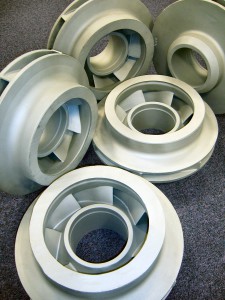 The drive for improved performance and total cost focus is creating opportunities for novel casting process. Impellers play a crucial part in a pump’s overall efficiency, but ensuring their blades are perfectly balanced and of a suitable surface quality, thickness and geometry to ensure a long service life, delivering maximum flow rates, is difficult to achieve using traditional casting processes. It is not unusual for blade thicknesses to vary, when impellers are made using sand moulds and, although they can be dynamically balanced in air, that does not mean they will remain balanced during operation, when pumping a fluid. Improving the surface quality of the impeller’s blades is also difficult and expensive because protective shrouds severely restrict access.
The drive for improved performance and total cost focus is creating opportunities for novel casting process. Impellers play a crucial part in a pump’s overall efficiency, but ensuring their blades are perfectly balanced and of a suitable surface quality, thickness and geometry to ensure a long service life, delivering maximum flow rates, is difficult to achieve using traditional casting processes. It is not unusual for blade thicknesses to vary, when impellers are made using sand moulds and, although they can be dynamically balanced in air, that does not mean they will remain balanced during operation, when pumping a fluid. Improving the surface quality of the impeller’s blades is also difficult and expensive because protective shrouds severely restrict access.
Castings Technology International, based on the Advanced Manufacturing Park at Catcliffe, near Sheffield, realised its Replicast® process could offer an alternative solution. The organisation, which specialises in helping castings companies to solve problems and improve production, has now further developed the process so that it can produce impellers which have inherently challenging narrow passageways. As a result, Replicast® can now be used to produce correctly balanced impellers up to a metre in diameter with high dimensional accuracy and superior surface finish.
At first, it seemed that the lower cost of impellers made using traditional processes limited demand for Replicast® impellers. However, that is changing following optimisation of the Replicast® process, which has reduced the cost of impellers by around 30 per cent, and a shift of focus among pump users and manufacturers towards the total cost of pump ownership and ‘up time’. At least one manufacturer has moved from focusing on a casting’s ticket price to how much it costs them to buy the raw casting, process it and install it in a pump. The switch makes Cti’s impellers far more attractive since they have significantly lower, to zero, non-conformance costs, require little or no “detailing” and far less finish machining, thanks to the company’s near-net-shape process.
Replicast® uses ceramic shells formed around sacrificial replica patterns, made directly from CAD designs using additive manufacturing technologies or machined from polystyrene. Tests have shown that pumps using Replicast® impellers are 10 per cent more efficient than impellers made by traditional methods, which means pumps can be smaller, further reducing material and manufacturing costs. New designs can be produced in half the time it would take if a conventional wooden pattern had to be made, modifications can be made just as rapidly and it is far easier to reverse engineer a product, using a Coordinate Measuring Machine to collect the data to produce a CAD design from which the sacrificial pattern can be made.
“The oil and gas, chemical process, power and water purification industries are all beginning to focus on total cost and realising how financially damaging it can be to suffer any down time because of pump failures,” says Cti’s Richard Gould.



